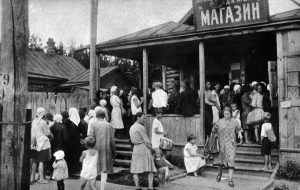
How did the Soviet people survive the war? After the Nazi invasion, the Soviet state quickly established a hierarchical rationing system to ensure food to the population. Yet the loss of the occupied territories created severe shortages. By 1942, people had begun to starve. Even industrial workers, who received the highest rations, were living on a single bowl of cabbage soup a day. Food shortage prompted the growth of black markets and theft, from petty pilfering to large scale embezzlement. Some officials siphoned food from workers to create new hierarchies to benefit themselves. Others redistributed food to help more poorly-provisioned groups like orphans and white collar workrs. The ration system, which ultimately proved successful, was established by the state and remade in practice in a constant struggle over food.
Wendy Z. Goldman, Paul Mellon Distinguished Professor of History, is a social and political historian of Russia. Her early work, Women, the State and Revolution: Soviet Family Policy and Social Life, 1917-1936 (Cambridge University Press, 1993) and Women at the Gates: Gender and Industry in Stalin’s Russia Women (Cambridge University Press, 2002) focused on family policy, women’s emancipation, and industrialization. More recently, she has written about Stalinist repression in Terror and Democracy in the Age of Stalin: The Social Dynamics of Repression (Cambridge University Press, 2007) and Inventing the Enemy: Denunciation and Terror in Stalin’s Russia (Cambridge University Press, 2011.) Her latest work, (co edited with Donald Filtzer,) Hunger and War: Food Provisioning in the Soviet Union During World War II (Indiana University Press, 2015) examines conditions and food policy at the front and in the rear in the Soviet Union. She recently published (with Joe Trotter, co-editor) The Ghetto in Global History. 1500 to the Present (Routledge, 2018.) She is currently at work on a book about the Soviet home front during WW II, Fortress Dark and Stern. Life, Labor, and Loyalty on the Soviet Home Front during World War II (Oxford University Press, forthcoming.) Her articles and books have been translated into Russian, Spanish, Portuguese, Italian, German, and Japanese. She directs a long-running faculty and graduate student exchange between CMU and Russian State University for the Humanities, and is the head of the Socialist Studies Seminar, an ongoing discussion group of faculty and graduate students focused on socialist and post socialist movements and states.
Event detail
- Event start
- 15. 5. 2018 19:15 - 21:00
- Venue
- nám. Jana Palacha 2, Prague 1 (Charles University, Faculty of Arts, room n. 104)
- Website
- www.facebook.com/events/768110833395383/
- Event type
- Lecture




